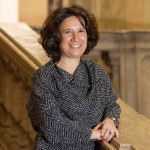Bank of Portugal appoints two new directors
The Bank of Portugal has appointed economists Clara Raposo (pictured) and Luís Máximo dos Santos as vice-governors of the Bank of Portugal along with Francisca Guedes de Oliveira, Helena Adegas and Rui Miguel Pinto as directors.
At the official swearing in ceremony, the Governor of the Bank of Portugal said that the Bank of Portugal now has the “most qualified board of directors that it has had in many years” with an equality of the sexes that has “never existed at the central bank”.
The board has been sworn in at the “best moment” to meet the “challenge of dealing with inflation which is once again in the spotlight”, said the former Minister of Finances, Mário Centeno
The governor then went on to say what it meant to be an independent central bank and how being independent was interpreted at the Bank of Portugal – an independence that is being questioned by the former Governor the Bank of Portugal Carlos Costa, who in his book “The Governor’ accused Prime Minister António Costa of political interference in the EuroBic case.
In that case the Prime Minster sought to prevent the removal and sanction of one of its main shareholders, Isabel dos Santos following the Wikileaks alleged corruption, money laundering, and fraud revelations over fears it would damage Luso-Angolan bi-lateral relations since she is the daughter of the former and now deceased Angolan President, José Eduardo dos Santos.
Mário Centeno said independence meant, in addition to legislation, the way the institution acts at any given moment. “The decisions of the bank qualify and justify its independence”.
“It is no use to appeal to a concept if the actions and results of these actions do not achieve the goals that can justify them”.
Regarding the Board of Directors that he will lead, he said it would carry out its functions “with responsibility and open to public scrutiny”, but “always safeguarding the privileged information that is confided to it”.
“The Bank of Portugal has survived for 176 years, and only by doing this can we hope to survive as a Portuguese institution for another 176 years”, he said.










